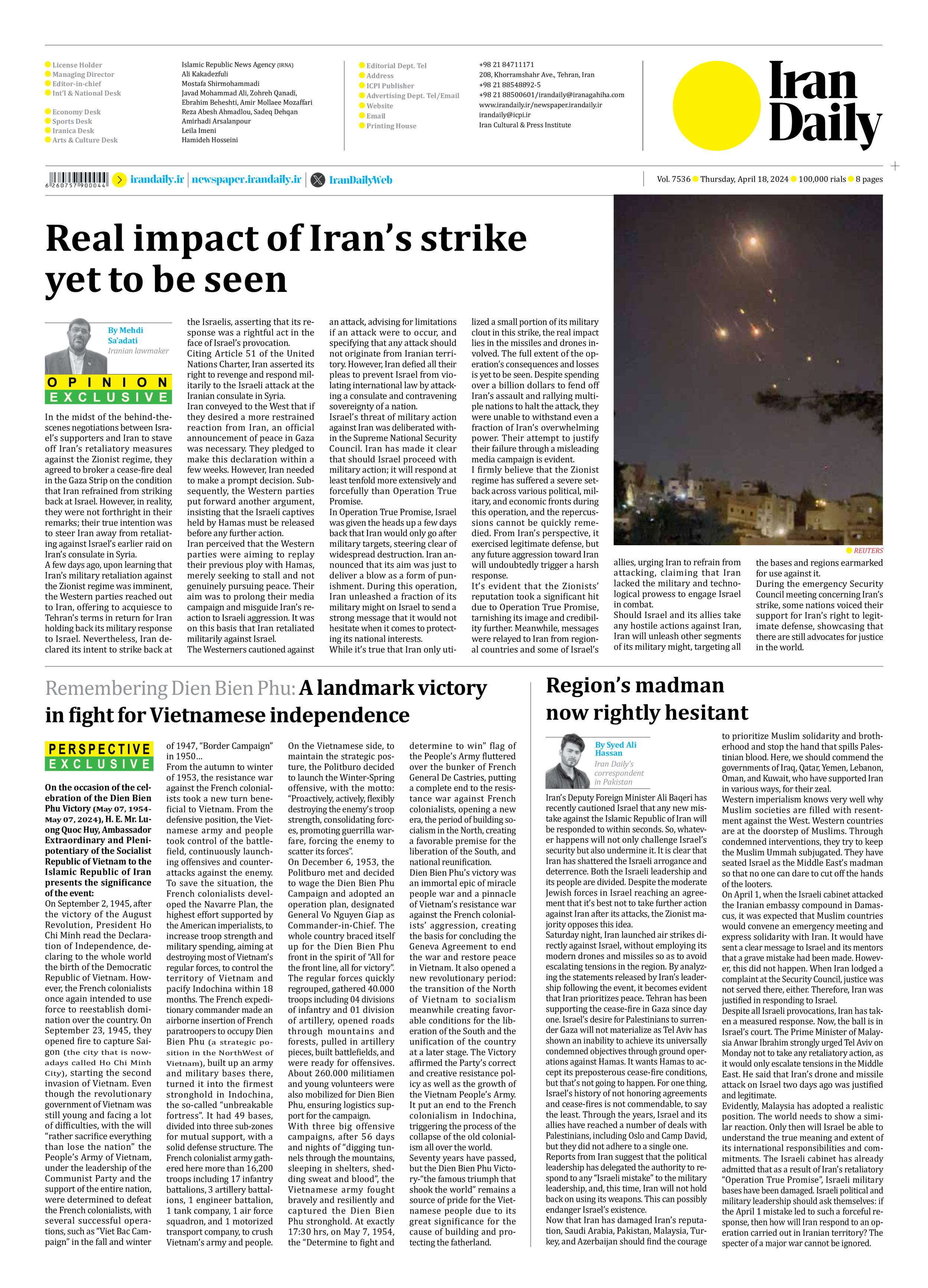
Real impact of Iran’s strike yet to be seen
By Mehdi Sa’adati
Iranian lawmaker
In the midst of the behind-the-scenes negotiations between Israel’s supporters and Iran to stave off Iran’s retaliatory measures against the Zionist regime, they agreed to broker a cease-fire deal in the Gaza Strip on the condition that Iran refrained from striking back at Israel. However, in reality, they were not forthright in their remarks; their true intention was to steer Iran away from retaliating against Israel’s earlier raid on Iran’s consulate in Syria.
A few days ago, upon learning that Iran’s military retaliation against the Zionist regime was imminent, the Western parties reached out to Iran, offering to acquiesce to Tehran’s terms in return for Iran holding back its military response to Israel. Nevertheless, Iran declared its intent to strike back at the Israelis, asserting that its response was a rightful act in the face of Israel’s provocation.
Citing Article 51 of the United Nations Charter, Iran asserted its right to revenge and respond militarily to the Israeli attack at the Iranian consulate in Syria.
Iran conveyed to the West that if they desired a more restrained reaction from Iran, an official announcement of peace in Gaza was necessary. They pledged to make this declaration within a few weeks. However, Iran needed to make a prompt decision. Subsequently, the Western parties put forward another argument, insisting that the Israeli captives held by Hamas must be released before any further action.
Iran perceived that the Western parties were aiming to replay their previous ploy with Hamas, merely seeking to stall and not genuinely pursuing peace. Their aim was to prolong their media campaign and misguide Iran’s reaction to Israeli aggression. It was on this basis that Iran retaliated militarily against Israel.
The Westerners cautioned against an attack, advising for limitations if an attack were to occur, and specifying that any attack should not originate from Iranian territory. However, Iran defied all their pleas to prevent Israel from violating international law by attacking a consulate and contravening sovereignty of a nation.
Israel’s threat of military action against Iran was deliberated within the Supreme National Security Council. Iran has made it clear that should Israel proceed with military action; it will respond at least tenfold more extensively and forcefully than Operation True Promise.
In Operation True Promise, Israel was given the heads up a few days back that Iran would only go after military targets, steering clear of widespread destruction. Iran announced that its aim was just to deliver a blow as a form of punishment. During this operation, Iran unleashed a fraction of its military might on Israel to send a strong message that it would not hesitate when it comes to protecting its national interests.
While it’s true that Iran only utilized a small portion of its military clout in this strike, the real impact lies in the missiles and drones involved. The full extent of the operation’s consequences and losses is yet to be seen. Despite spending over a billion dollars to fend off Iran’s assault and rallying multiple nations to halt the attack, they were unable to withstand even a fraction of Iran’s overwhelming power. Their attempt to justify their failure through a misleading media campaign is evident.
I firmly believe that the Zionist regime has suffered a severe setback across various political, military, and economic fronts during this operation, and the repercussions cannot be quickly remedied. From Iran’s perspective, it exercised legitimate defense, but any future aggression toward Iran will undoubtedly trigger a harsh response.
It’s evident that the Zionists’ reputation took a significant hit due to Operation True Promise, tarnishing its image and credibility further. Meanwhile, messages were relayed to Iran from regional countries and some of Israel’s allies, urging Iran to refrain from attacking, claiming that Iran lacked the military and technological prowess to engage Israel in combat.
Should Israel and its allies take any hostile actions against Iran, Iran will unleash other segments of its military might, targeting all the bases and regions earmarked for use against it.
During the emergency Security Council meeting concerning Iran’s strike, some nations voiced their support for Iran’s right to legitimate defense, showcasing that there are still advocates for justice in the world.







